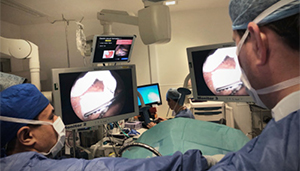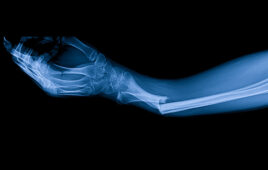
Dr. Sanjay Purkayastha at Imperial College performs a bariatric procedure to demonstrate the efficacy of Digital Surgery’s AI platform. [Image courtesy of Digital Surgery]
The patented AI platform includes surgical procedure roadmaps that are meant to aid the surgical team in an OR. The goal is to reduce risk and make surgery safer.
“This is a huge milestone for the future of surgery because it lays the foundation for how AI and computer vision will support surgical teams to deliver safer surgeries. It also enables the next generation of robotic surgery, giving these future systems the capability to function more intelligently and safely,” Dr. Jean Nehme, co-founder and CEO of Digital Surgery, said in a news release today.
“We have already developed AI algorithms for multiple procedures across bariatrics and other surgical specialties like orthopedics, and our library will continue to grow,” Nehme said. “With AI, we have the unique ability to scale global surgical best practices.”
The team behind Digital Surgery previously gained attention through their mobile Touch Surgery training simulations — with more than 150 simulations used by more than 2.5 million users around the world.
In the news release announcing the demonstration of the AI platform, surgeons touted the potential of Digital Surgery.
“What Digital Surgery has done with this technology feels like a comparison with the advent of laparoscopy, which was a truly disruptive and groundbreaking revolution and paradigm shift in surgery,” said Dr. Sanjay Purkayastha, a surgeon at Imperial College Healthcare NHS Trust and clinical senior lecturer at Imperial College London.
Dr. Daniel Buchbinder of the Mount Sinai School of Medicine said Digital Surgery is “creating the technologies that will drive the ‘integrated ORs’ and robotic systems of the future.”
As in other parts of the healthcare marketplace, “value” has become an important driver in surgical innovation. The idea is to harness data to improve outcomes, boost access and training, and reduce cost and waste.






